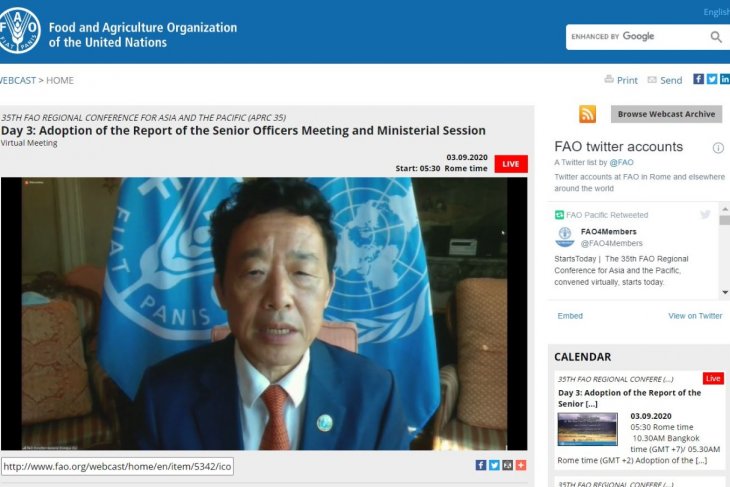Live Streaming
Program Highlight
Company Profile
Securing Regional Food Resilience Dominates Agenda at FAO Meet
Written by Ani Hasanah
FAO director-general Qu Dongyu delivers a speech at the 35th Session of FAO’s Regional Conference for Asia and the Pacific (APRC), held on Thursday (September 3, 2020). (HO-FAO Indonesia)
Government representatives from 46 countries in the Asia-Pacific region gathered online on Thursday to examine the state of regional food security and highlighted the need to build a more resilient food system in the region.
The 35th session of FAO's Regional Conference for Asia and the Pacific (APRC) put special emphasis on the implications of the spread of the coronavirus and its impact on food systems region-wide, according to a release issued by FAO Indonesia, which was received in Jakarta on Thursday.
The Asia-Pacific region is home to more than half of the world's undernourished. While the prevalence of hunger has decreased slightly, the region is far behind the pace needed to eradicate hunger and malnutrition by 2030, the Sustainable Development Goal deadline set by the global community to eliminate hunger and malnutrition in all its forms, the statement said.
Speaking to more than 400 participants of the online conference from Rome, FAO director-general Qu Dongyu highlighted the negative effects of the pandemic, which have been felt across the entire food system.
"Measures to control virus outbreaks are disrupting global food supply chains. Border restrictions and lockdowns are destroying livelihoods and hindering food transport. Food loss and waste is increasing, as farmers must resort to dumping perishables, and many people in urban centers are struggling to access fresh food," he noted.
Qu stressed that smallholder farmers and their families, food workers in all sectors, and those living in a commodity- and tourism-dependent economies, are particularly vulnerable.
"They urgently need our attention. We need to re-examine our food systems and value chains, make greater use of existing agricultural innovations and technologies, and consider new ones," he said.
In response to the pandemic, the FAO has launched the FAO COVID-19 Response and Recovery Program, which allows donors to leverage the organization's convening power, real-time data, early warning systems, and technical expertise to provide direct support, where and when it is needed the most.
The FAO Regional Conference serves as a forum for addressing current and emerging regional trends and challenges. This year's conference mulled the FAO's new Hand-in-Hand Initiative.
The initiative focuses on improving the potential of disadvantaged areas and groups of the population, in line with the UN's commitment to "leave no one behind”. (ANTARA)



